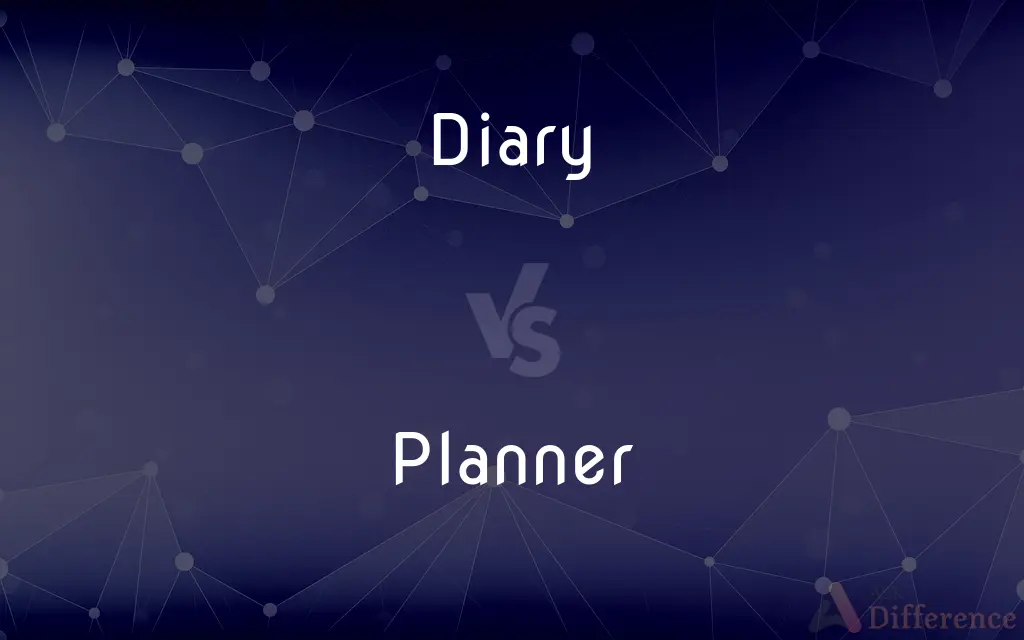Diary vs. Planner — What's the Difference?
Edited by Tayyaba Rehman — By Urooj Arif — Updated on April 23, 2024
A diary is used for recording personal experiences and reflections, often daily, while a planner is designed for scheduling and organizing future tasks and events.

Difference Between Diary and Planner
Table of Contents
ADVERTISEMENT
Key Differences
A diary primarily serves as a personal record, where individuals jot down daily experiences, thoughts, and feelings, focusing on introspection and personal history. On the other hand, a planner is utilized to manage one’s time efficiently, keeping track of appointments, tasks, and important dates, emphasizing future planning and organization.
While diaries often feature dated or undated pages with ample space for freeform writing, planners are structured with specific sections for dates, times, and to-do lists to facilitate planning and task management. Whereas planners are more structured and methodical in layout, providing tools like calendars, checklists, and priority boxes to help users organize their commitments and goals systematically.
Diaries encourage a more emotional and reflective writing style as users explore their inner thoughts and document significant life events. In contrast, planners focus on practical and concise entries to optimize productivity and time management, typically devoid of emotional content.
The audience for diaries generally consists of individuals seeking a private space to express themselves and document their personal journeys. On the other hand, planners are aimed at anyone with tasks to manage, from students and professionals to homemakers, highlighting their broad utility across various lifestyles.
While diaries provide a historical perspective of an individual’s life and are often revisited for reflection or reminiscence, planners are forward-looking, primarily used for tracking upcoming events and tasks, and once completed, they often hold no further use except for reference or archival purposes.
ADVERTISEMENT
Comparison Chart
Primary Use
Documenting personal experiences
Scheduling and organizing tasks
Content Style
Narrative, reflective
Structured, task-oriented
Layout
Dated/undated pages, freeform space
Calendar views, to-do lists, time slots
Target Audience
Individuals seeking personal reflection
Individuals managing tasks and schedules
Longevity of Use
Often kept for years for reflection
Used cyclically, often annually
Compare with Definitions
Diary
A book in which one records personal experiences and thoughts daily.
She writes in her diary every night about her thoughts and daily events.
Planner
A tool for organizing daily, weekly, or monthly schedules.
Her planner is filled with meeting times, deadlines, and reminders.
Diary
Used for self-reflection and emotional expression.
His diary served as a therapeutic tool for coping with stress.
Planner
Emphasizes task management and efficiency.
He uses a planner to ensure all his project tasks are completed on time.
Diary
Often private and not intended for public sharing.
He keeps his diary under lock and key to maintain privacy.
Planner
May include goal setting and priority lists.
The planner has sections for setting monthly personal and professional goals.
Diary
May include details about personal relationships and introspections.
Her diary entries often discuss her progress in personal goals and feelings.
Planner
Designed to be practical and frequently consulted.
Her planner is always open on her desk for easy access to her schedule.
Diary
Can serve as a historical record of one’s life.
The diary chronicled twenty years of her life's highs and lows.
Planner
Often used by students and professionals alike.
The student organizes her study and exam schedule using a detailed planner.
Diary
A diary is a record (originally in handwritten format) with discrete entries arranged by date reporting on what has happened over the course of a day or other period. A personal diary may include a person's experiences, thoughts, and/or feelings, excluding comments on current events outside the writer's direct experience.
Planner
A person who makes plans
Curriculum planners
Economic planners
Diary
A book in which one keeps a daily record of events and experiences.
Planner
A list or chart with information that is an aid to planning
My day planner
Diary
A usually daily written record of personal experiences and observations; a journal.
Planner
An orderly or step-by-step conception or proposal for accomplishing an objective
A plan for improving math instruction.
Diary
A daily record of events or measurable phenomena, usually kept to track patterns over time
Kept a diary of blood sugar levels.
Planner
A proposed or intended course of action
Had no plans for the evening.
Diary
A book or computer file used for keeping such a record.
Planner
A systematic arrangement of elements or important parts; a configuration or outline
A seating plan.
The plan of a story.
Diary
A daily log of experiences, especially those of the writer.
They kept separate diaries. His was on paper and her diary was on her computer's hard drive.
Planner
A drawing or diagram made to scale showing the structure or arrangement of something.
Diary
A personal organizer or appointment diary.
Planner
In perspective rendering, one of several imaginary planes perpendicular to the line of vision between the viewer and the object being depicted.
Diary
(obsolete) Lasting for one day.
Planner
A program or policy stipulating a service or benefit
A pension plan.
Diary
(intransitive) To keep a diary or journal.
Planner
To formulate a scheme or program for the accomplishment, enactment, or attainment of
Plan a campaign.
Diary
A register of daily events or transactions; a daily record; a journal; a blank book dated for the record of daily memoranda; as, a diary of the weather; a physician's diary.
Planner
To have as a specific aim or purpose; intend
They plan to buy a house.
Diary
Lasting for one day; as, a diary fever.
Planner
To draw or make a graphic representation of.
Diary
A daily written record of (usually personal) experiences and observations
Planner
To make plans.
Diary
A personal journal (as a physical object)
Planner
One who plans.
Johnny is a good planner. He starts his work in time to get it finished by the deadline.
Ms. Gunston is a planner for the county.
Planner
A notebook or software in which one keeps reminders of items such as appointments, tasks, projects, and contacts.
Planner
One who plans; a projector.
Planner
A person who makes plans
Planner
A notebook for recording appointments and things to be done, etc.
Common Curiosities
What is the primary purpose of a diary compared to a planner?
A diary is used for recording personal experiences and emotions, while a planner is designed for organizing and scheduling tasks and events.
Who typically uses a diary?
Diaries are typically used by individuals who wish to document their personal life, reflect on experiences, or express emotions privately.
How does the content in a planner differ from that in a diary?
The content in a planner is task-oriented and practical, focusing on future events and tasks, while a diary's content is more narrative and emotional, focusing on past or present experiences.
What are the key features of a planner?
Key features of a planner include calendars, to-do lists, time slots, and sometimes sections for goal setting and prioritization.
Is a planner necessary for effective time management?
While not absolutely necessary, a planner can significantly enhance time management by organizing tasks and schedules in a structured manner.
What type of planner is most effective for students?
A planner with monthly and weekly sections, as well as space for notes and task priorities, is most effective for students managing academic and extracurricular activities.
Can a diary help in personal growth?
Yes, regularly writing in a diary can aid in personal growth by allowing introspection and tracking personal development over time.
Can a diary and a planner be combined into one book?
Yes, some books combine features of both a diary and a planner, allowing space for both reflective writing and structured scheduling.
Can keeping a diary improve mental health?
Yes, keeping a diary can improve mental health by providing an outlet for expressing thoughts and feelings, reducing stress, and enhancing self-awareness.
Why might someone choose a diary over a digital app?
Individuals may choose a diary over a digital app for privacy, the physical act of writing, or a preference for a tangible record of their thoughts.
How often should one update their diary?
The frequency of diary updates depends on the individual; some update daily, while others write as needed based on significant events or feelings.
How can a planner aid in achieving goals?
A planner can aid in achieving goals by allowing individuals to break down their objectives into manageable tasks and set deadlines.
What materials are planners and diaries typically made from?
Both planners and diaries are commonly made from paper, though their covers can range from simple cardstock to high-quality leather.
Do professionals use planners differently from students?
Professionals may use planners more for meeting schedules and project deadlines, whereas students typically focus on academic schedules and assignment due dates.
What should someone consider when choosing between a diary and a planner?
When choosing between a diary and a planner, consider whether your primary need is emotional expression and recording life events or organizing tasks and managing time efficiently.
Share Your Discovery

Previous Comparison
Gofer vs. Gopher
Next Comparison
Stripe vs. StripAuthor Spotlight
Written by
Urooj ArifUrooj is a skilled content writer at Ask Difference, known for her exceptional ability to simplify complex topics into engaging and informative content. With a passion for research and a flair for clear, concise writing, she consistently delivers articles that resonate with our diverse audience.
Edited by
Tayyaba RehmanTayyaba Rehman is a distinguished writer, currently serving as a primary contributor to askdifference.com. As a researcher in semantics and etymology, Tayyaba's passion for the complexity of languages and their distinctions has found a perfect home on the platform. Tayyaba delves into the intricacies of language, distinguishing between commonly confused words and phrases, thereby providing clarity for readers worldwide.
















































